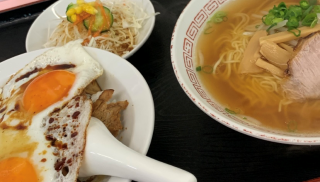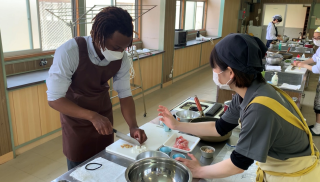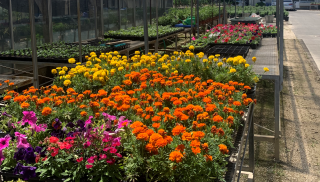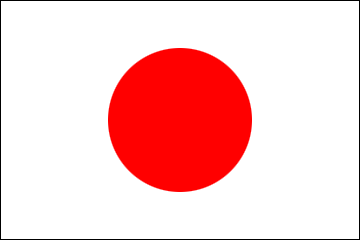JET Programme Series: The Mikan Takes Bloom - Troy Roberts
2022/7/21



JET Programme Series: The Mikan Takes Bloom - Troy Roberts


For the renowned fruit of my prefecture ‘Mikan’ (also known as Satsuma Mandarin Oranges), the first few months of its growth are vital in setting the stage for bountiful harvests in the winter months. With the right environment and support, these oranges go from blooming in April, bearing fruit, increasing in size, to finally changing colour and becoming ripe for picking by the end of the year. Likening myself to that of a mikan, I’m quickly approaching my third month living here in Japan and so far it has been filled with intrigue, an abundance of support and many an opportunity to grow…as an individual.
Coming to the city of Imabari brought with it a lot of firsts for my school. I became the first Assistant Language Teacher to be placed at the senior high school full time, transitioning it from a ‘visit school’ to that of a ‘base school’. This meant that instead of an ALT only coming to the school twice a month to teach English, now the school had its very own ALT to work from most days. Because I was the first here, it was a learning experience along with staff in getting settled. However, I was shown early on how helpful and welcoming Japanese people can be with any problem we may have encountered. So fast-forward apartment hunting, phone troubles, two banks and receiving a ‘buss-foot’ from learning how to ride a bicycle again…I’ve become accustomed to life here in the Shikoku region.
My base school covers general subjects offered at most secondary schools. However, it boasts an impressive agricultural and sporting course, having its own dedicated campus along with two farms within proximity to the school. Here, students take part in floral arrangement classes in addition to growing an assortment of fruits, vegetables and flowers. Every week, the crops produced here are then sold to staff and students at the main school for a criminally low price (in my opinion). So far, they’ve harvested and sold melongene, sweet corn (their best seller), cucumbers, sweet peppers and mini tomatoes (my personal favourite). I’ve become absolutely fascinated with the process of farming and taking care of plants now, slowly gaining my own green thumb by growing a variety of chrysanthemums along with the second-year students.
In addition to my base school, I have two visits schools which I make trips to at least twice a month. One of which is a technical school, specializing in shipbuilding and teaching students the intricacies of towel-making (both of which my city is famous for). The other, is small high school just shy of eighty students located on an island a short ferry ride away. Going to this school gives the feeling of taking a boat ‘down de islands’ every time, due to its relaxed atmosphere and similar sights to back home in Trinidad.
Teaching at the senior high school level across vastly different schools, I’ve been able to make language learning engaging for my students whilst introducing them to popular landmarks in T&T, show off our diverse food and other important aspects of our unique culture. Recently, I even taught some students about the popular Caribbean gesture of the ‘meggie’, having it run as a practical joke where you’d have to find intricate ways of making people look at it and catch them off guard. It got so popular in one class that for picture day, all the students (and even the homeroom teacher) posed showing ‘meggies’ to the camera. It is a photo I await patiently for once the yearbook releases and serves as a lighthearted example of incorporating Trinbagonian and by extension Caribbean culture in the lives of the Japanese people.
When I’m not teaching or in the staff room studying Japanese, most can find me in a home economics classroom, learning to make a new dish or two. With one of my goals being to study Japanese cuisine in depth, I couldn’t pass on the opportunity to learn traditional Japanese dishes directly from the teachers at my various schools. Japanese cuisine has always been something I’d enjoyed back home but given it was limited to mostly ramen and sushi, having the chance to sample all what Japan has to offer has made me come to love and respect it even more. From Japanese Curry to Tonkatsu, Udon and even Natto, I’m always looking for the next to dish to try. Locally, the popular dishes of Imabari comprise of; “Tai-Meshi” a somewhat saltfish like cook-up rice made with sea bream (not my favorite), “Yaki-Tori” skewered chicken typically grilled over charcoal but instead are cooked on a flat-top griddle…and the pride and joy of the city itself “Yakibuta Tamago Meshi”.
In the wider community I’ve been fortunate to participate in events held by the ICIEA, a local organization helping to foster favorable relations between foreigners and locals here in Imabari. I’ve been able to meet an array of interesting new people and worked together with some of them in a world quiz as part of the Spring International Fair held by the city. Personally, I can’t wait to participate in the upcoming Onmaku festival, one which celebrates all that summer has to offer and unfortunately couldn’t take place for a few years due to COVID 19.
Ultimately, I’ve been thoroughly enjoying my time in Japan thus far and will gladly give further updates on life here in the future. With my newfound love for cycling, I’m planning to attempt the Shimanimi Kaido very soon…once the heat here in Japan is more conducive to cycling.
JET Series: The Mikan Takes Bloom (Japanese Embassy's Facebook)
JET Programme Series Archives
Coming to the city of Imabari brought with it a lot of firsts for my school. I became the first Assistant Language Teacher to be placed at the senior high school full time, transitioning it from a ‘visit school’ to that of a ‘base school’. This meant that instead of an ALT only coming to the school twice a month to teach English, now the school had its very own ALT to work from most days. Because I was the first here, it was a learning experience along with staff in getting settled. However, I was shown early on how helpful and welcoming Japanese people can be with any problem we may have encountered. So fast-forward apartment hunting, phone troubles, two banks and receiving a ‘buss-foot’ from learning how to ride a bicycle again…I’ve become accustomed to life here in the Shikoku region.
My base school covers general subjects offered at most secondary schools. However, it boasts an impressive agricultural and sporting course, having its own dedicated campus along with two farms within proximity to the school. Here, students take part in floral arrangement classes in addition to growing an assortment of fruits, vegetables and flowers. Every week, the crops produced here are then sold to staff and students at the main school for a criminally low price (in my opinion). So far, they’ve harvested and sold melongene, sweet corn (their best seller), cucumbers, sweet peppers and mini tomatoes (my personal favourite). I’ve become absolutely fascinated with the process of farming and taking care of plants now, slowly gaining my own green thumb by growing a variety of chrysanthemums along with the second-year students.
In addition to my base school, I have two visits schools which I make trips to at least twice a month. One of which is a technical school, specializing in shipbuilding and teaching students the intricacies of towel-making (both of which my city is famous for). The other, is small high school just shy of eighty students located on an island a short ferry ride away. Going to this school gives the feeling of taking a boat ‘down de islands’ every time, due to its relaxed atmosphere and similar sights to back home in Trinidad.
Teaching at the senior high school level across vastly different schools, I’ve been able to make language learning engaging for my students whilst introducing them to popular landmarks in T&T, show off our diverse food and other important aspects of our unique culture. Recently, I even taught some students about the popular Caribbean gesture of the ‘meggie’, having it run as a practical joke where you’d have to find intricate ways of making people look at it and catch them off guard. It got so popular in one class that for picture day, all the students (and even the homeroom teacher) posed showing ‘meggies’ to the camera. It is a photo I await patiently for once the yearbook releases and serves as a lighthearted example of incorporating Trinbagonian and by extension Caribbean culture in the lives of the Japanese people.
When I’m not teaching or in the staff room studying Japanese, most can find me in a home economics classroom, learning to make a new dish or two. With one of my goals being to study Japanese cuisine in depth, I couldn’t pass on the opportunity to learn traditional Japanese dishes directly from the teachers at my various schools. Japanese cuisine has always been something I’d enjoyed back home but given it was limited to mostly ramen and sushi, having the chance to sample all what Japan has to offer has made me come to love and respect it even more. From Japanese Curry to Tonkatsu, Udon and even Natto, I’m always looking for the next to dish to try. Locally, the popular dishes of Imabari comprise of; “Tai-Meshi” a somewhat saltfish like cook-up rice made with sea bream (not my favorite), “Yaki-Tori” skewered chicken typically grilled over charcoal but instead are cooked on a flat-top griddle…and the pride and joy of the city itself “Yakibuta Tamago Meshi”.
In the wider community I’ve been fortunate to participate in events held by the ICIEA, a local organization helping to foster favorable relations between foreigners and locals here in Imabari. I’ve been able to meet an array of interesting new people and worked together with some of them in a world quiz as part of the Spring International Fair held by the city. Personally, I can’t wait to participate in the upcoming Onmaku festival, one which celebrates all that summer has to offer and unfortunately couldn’t take place for a few years due to COVID 19.
Ultimately, I’ve been thoroughly enjoying my time in Japan thus far and will gladly give further updates on life here in the future. With my newfound love for cycling, I’m planning to attempt the Shimanimi Kaido very soon…once the heat here in Japan is more conducive to cycling.
JET Series: The Mikan Takes Bloom (Japanese Embassy's Facebook)
JET Programme Series Archives
